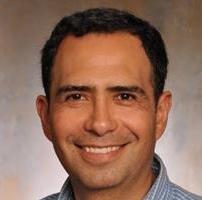Lung cancer screening is recommended only for those who are at high risk for the disease — adults ages 50–80 who smoke at least 20 packs a year — but even among members of that high-risk group, screening rates remain low, ranging from 5% to 20% of those eligible for the screening CT scan.
New research, published in Medical Care, from CU Cancer Center member Marcelo Perraillon, PhD, shows that when high-risk individuals become eligible for Medicare, screening rates increase. The rise is most dramatic in high-risk males, who saw a 16% jump in screening rates after becoming eligible for the government-funded health insurance.
The effects of increased access
Perraillon, who co-directs the CU Cancer Center’s Population Health Shared Resource, used data from the Centers for Disease Control’s Behavioral Risk Factor Surveillance System (BRFSS) to conduct his research. The BRFSS is a system of health-related telephone surveys that collect state-level data about health-related risk behaviors, chronic health conditions, and use of preventive services among U.S residents.
Perraillon and colleagues at the University of Wisconsin-Madison, who regularly work with claims data sets and surveys like the BRFSS, hypothesized that access to insurance would impact screening numbers.
“There are good reasons to believe that insurance is going to have an effect,” he says. “If you don’t have insurance and you want to get screened for lung cancer, then it's going to be expensive. And you have to pay out of pocket. But if you have insurance, that screening could be free if the screening criteria is met. The question is, what will be the impact of having access to Medicare?”
The impact could be greater for males, he says, because males typically put off preventative screenings and other medical visits more than females do. Males also are at higher risk for lung cancer since they smoke at a higher rate than women.
Additionally, as individuals become eligible for Medicare, they often schedule welcome visits with their new physicians in which screenings are recommended.
“Medicare is going to have an obvious impact if you're uninsured and then you get Medicare when you turn 65,” Perraillon says. “However, it could also have an impact because some people in high-deductible plans may think that they have to pay a copay for a lung cancer screening even though it should be free. Access to care is also a problem for some patients. The low screening rates show than health insurance is just one factor.”
‘An invitation for more research’
For the next step in this research, Perraillon is working with CU Cancer Center member Jamie Studts, PhD, co-leader of the center’s Cancer Prevention & Control Program and the other co-director of the Population Health Shared Resource, and Rebecca Myerson, assistant professor of population health sciences at the University of Wisconsin-Madison, to study the effects of Medicare policy on lung cancer screening levels. For instance, Medicare requires shared decision-making appointments in which patients and their physicians decide together if a lung screening is warranted, weighing the patient’s risk factors against the potential harm of radiation exposure and false positive results.
He hopes other researchers will use his study as a jumping-off point to examine other factors that explain the increased screening rates that come from Medicare eligibility.
“It’s an invitation for more research because there are a lot of mechanisms that are worth exploring,” he says.
Digging into the data
As co-director of the Population Health Shared Resource at the CU Cancer Center, Perraillon not only conducts his own research, but he works to support health services research at the center. With Cathy Bradley, deputy director of the CU Cancer Center, and with support from a grant from the National Cancer Institute, he recently completed a project linking health insurance records from the Colorado All-Payer Claims Database to the Colorado Central Cancer Registry, identifying 93% of patients to get a more complete picture of their medical history before, during, and after their cancer diagnosis. A paper in the journal Health Services Research reports these findings.
“A lot of the states are forming all-payer claims databases,” he says. “The idea is that private and public insurance submit their insurance claims. If you got a CT screening for lung cancer, or you went to the doctor because of symptoms, you are going to be in that data set.”
Perraillon and colleagues linked the claims data to data in the Colorado Central Cancer Registry, which collects more specific and robust information on cancer diagnosis and stage. Records available for research in both databases are anonymized. The linked datasets create a more complete picture of the individuals diagnosed with cancer.
“If you go to the doctor or if you go to a hospital, and you’re diagnosed with lung cancer or any other cancer, this information goes to the cancer registry,” he says. “So you get a very detailed data set where each observation is a person. When you were diagnosed with cancer? At which stage were you diagnosed with cancer? What was the first course of treatment? What were your outcomes? Where do you live? Is it urban or rural? What is your age? What is your race? It’s used for surveillance, and it’s a very important data set that has created a lot a lot of research on cancer in the country. On the other hand, claims data provide a comprehensive picture of treatments and healthcare utilization over time so registry information is expanded.”
Perraillon is using the combined data for a number of research projects, including one to evaluate if the cancer registry correctly captures health insurance information; one to study insurance switching after a cancer diagnosis; and one that looks at the impact of COVID lockdowns on cancer screening.




